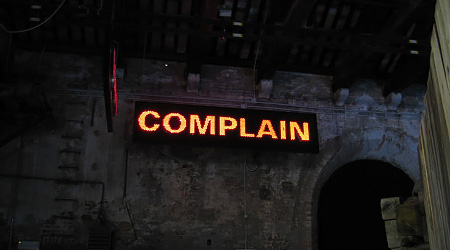Filing a Complaint Against a Bank or Credit Card Issuer

Whenever a consumer feels that they have been taken advantage of by a financial institution, bank, lender or any company whatsoever, they are entitled to report it to certain federal agencies. Since this website deals with consumer finance, below is a list of federal agencies that oversee the financial industry. One can file complaints with any of these agencies.
ConsumerFinance.gov -- This website was set up in 2010 by the federal government as a result of new federal legislation establishing a bureau to oversee consumer finance. It handles complaints about credit cards, debit cards, and all types of loans and, in fact, any matter regarding consumer finance. Consumers can file a complaint online and read lots of other information about financial matters. Many consumers have taken advantage of this website, with tens of thousands of complaints being filed as of early 2012.
Report the credit card issuer to the Comptroller of the Currency. The Comptroller of the Currency oversees the national banking industry and regularly issues rules on how banks can operate and proceed. Even if you don't have a complaint against any bank, you should visit the Comptroller of the Currency website because of the wealth of information it offers. And yes, you can file a complaint online against any national bank operating in the United States at their website located at HelpWithMyBank.gov
Report the company to your state's attorney general's office. You can find links to your state's AG website at NAAG.org. Your state might allow you to file a complaint online. This is probably the most effective complaint to make as far as complaining to government agencies is concerned since it is the attorney general's who have filed most of the lawsuits against credit card companies (other than private law firms filing class action lawsuits). For example, it was the California AG who sued Providian (a defunct credit card company) and forced them to pay the largest judgment against a credit card company ever.
Report the company to your elected representatives. You can find their email / mailing addresses at www.house.gov and www.senate.gov. Note that the banking industry has a lot of power in Washington, D.C. in the form of lobbyists and contribute heavily to election campaigns, spending millions each year on both. Despite this fact, your elected officials are more afraid of you because you can vote them out of office. If you think contacting them is a waste of time you're wrong. Someone will read your correspondence -- if enough complaints are received something will be done about it. Despite the efforts of the major banks, Congress passed legislation favorable to consumers in 2008, 2009, and 2010 because of the overwhelming number of complaints congressional members received from their constituency.
Report the company to the Federal Trade Commission (FTC). The FTC mailing address is Division of Credit Practices, Bureau of Consumer Protection, Federal Trade Commission, Washington, D.C. 20580 or you file a complaint online at www.ftc.gov. The FTC will only take action against a particular company if they receive many complaints and they do not represent individuals when they do take action. If a particular company is found to be in violation of any federal laws and regulations, they are usually required to make restitution and/ or pay a big fine to the federal government.
Report the company to the Better Business Bureau. Although the Better Business Bureau doesn't regulate banks, you can always submit your case for dispute resolution online at www.bbb.org. After all, the more people complain, the higher the odds of changing the way banks operate.
In summary, complain everywhere that you can if you want changes. When you take the time to complain you are not only helping yourself, but all your friends and relatives and society as a whole.







